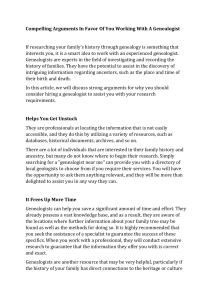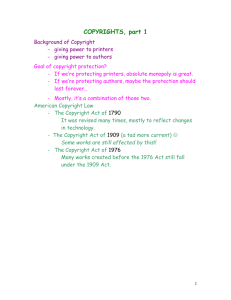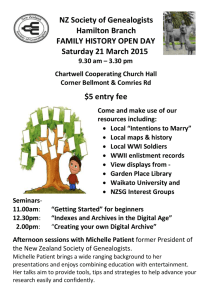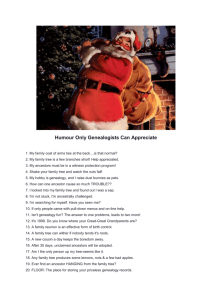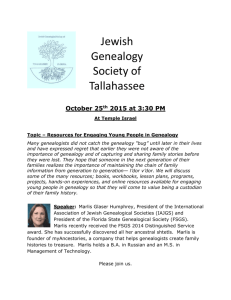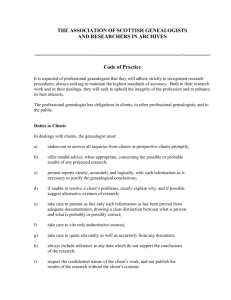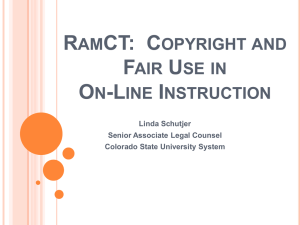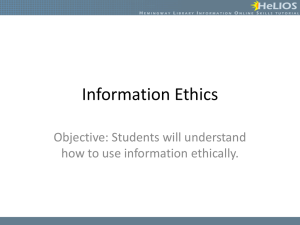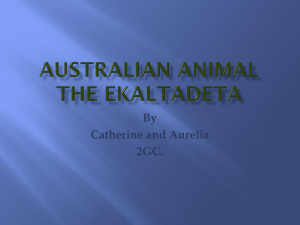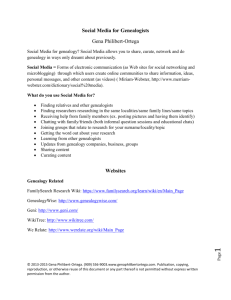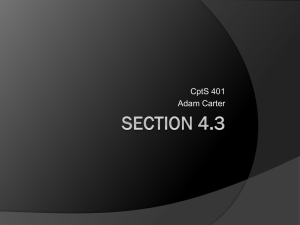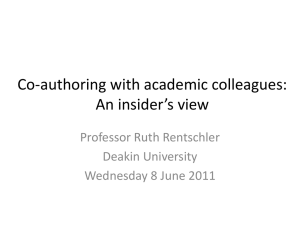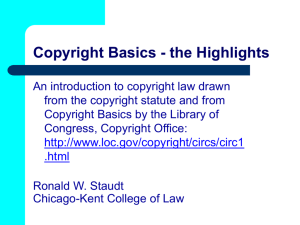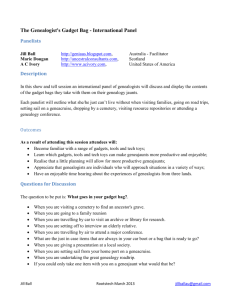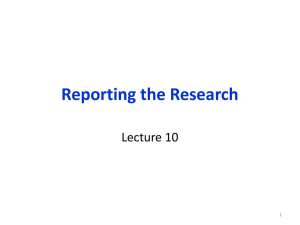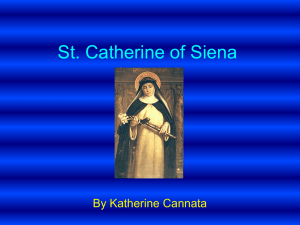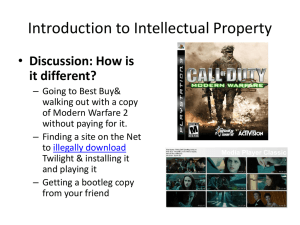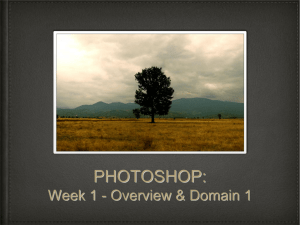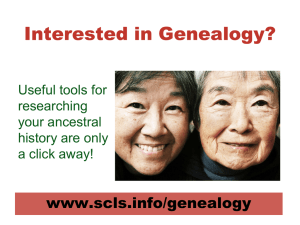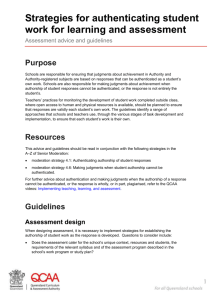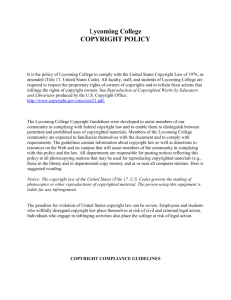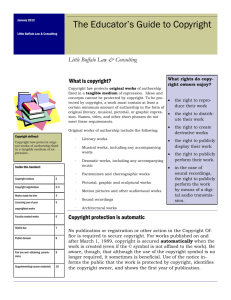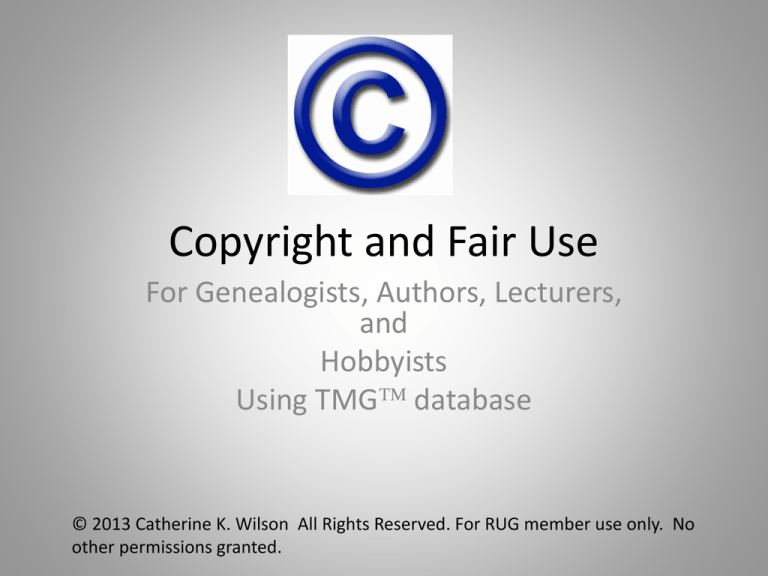
Copyright and Fair Use
For Genealogists, Authors, Lecturers,
and
Hobbyists
Using TMG database
© 2013 Catherine K. Wilson All Rights Reserved. For RUG member use only. No
other permissions granted.
Topics Covered in Lecture 1
•
•
•
•
•
A bit of copyright history
Copyright Law in US today
What does it mean
International Copyright Laws
Examples
First Copyright Law 1710
Earliest Copyright Law 1790
Image from wikimedia.org
Copyright Law of the United States
and Related Laws Contained in Title 17 of the
United States Code
• The complete text of the U.S. Copyright Law,
Dec 2011 in PDF format.
• http://www.copyright.gov/title17/
Copyright Law of US §102(a)
• “Copyright protection subsists in original
works of authorship fixed in any tangible
medium of expression, now known or later
developed, from which they can be perceived,
reproduced, or otherwise communicated,
either directly or with the aid of a machine or
device.”
What does this me for ME
Internet search did not reveal the copyright owner. Copied without
permission.
Copyright is Personal Property
• You own the copyright to your original work
at the moment it goes from an idea to a
tangible form.
You own the copyright for work you
created for yourself or a client
Photo by Christina Martin. Old Bones Genealogy, LLC.
Do I need to register my copyright?
Found on Dear Rich: Nolo’s Intellectual property blog. Copied
without permission .
How Long Does a Copyright Last?
Sonny Bono Copyright Term Extension
Act of 1998
• For works created after 1 Jan 1978, it lasts for
the life of the author plus 70 years.
• Anonymous, pseudonymous and works for
hire copyright lasts 95 years from the date of
first publication.
• Works not published or registered before 1
Jan 1978; life of author plus 70 years.
• Pre- 1978 original copyright term plus 95 years
from first copyright.
No, You Do Not Need a Copyright
Notice
• It is useful if you want to protect your work in
court because it makes the claim of ignorance
much harder to prove.
• If your work has monetary value you may also
want to register it with the copyright office.
This also helps in the event of a law suit.
Standard Copyright Format
• The word “Copyright” or the symbol ©
• Followed by the year the material was first
published
• Name of the person or organization that holds
the copyright
• Accepted examples:
• © 2013 Catherine K. Wilson
• Copyright 2013 Catherine K. Wilson
Should I Register My Copyright
• It Depends
• The copyright must be legally registered
before you can bring a law suit to defend it.
• Creates a presumption that your copyright is
valid and allows up to $150,000 (and possibly
lawyer fees) without having to prove any
actual harm.
Copyright Law of US §102 (b)
• “In no case does copyright protection for an
original work of authorship extend to any
idea..., regardless of the form in which it is
described….”
Copyright belongs to www/libweb.surrey.ac.uk. Used without
permission.
What is Public Domain
• Works whose intellectual property rights have
expired, been forfeited, or not applicable.
• Works of the U.S. Government are in the
public domain.
• Works created before 1923 in the U.S. are in
the Public Domain.
Http://onlinebooks.library.upenn.edu/okbooks.html
Excellent web site about how to get permission from copyright
holder,
Find books in the public domain, Copyright and public domain
of other countries
Using Government Records in
Genealogy Research
• Copyright protection is not available for any
work of the US Government. (Title 17 U.S.C.,
Section 105).
• You may produce material freely as you see fit
• The government politely asks that you cite the
source properly.
What about Transcripts and Indexes?
• “original works of authorship” are covered by
copyright.
• Works are granted copyright by creative
authorship or arrangements.
• Transcripts and Indexes, at best, are partially
covered by copyright.
http://www.self-publishing-coach.com/copyright-on-theinternet.html
Copyright laws apply equally on the
Internet as they do elsewhere.
Copyright and Genealogy
• Basic facts about ancestors (name, dates and
place, marriage partner) are not copyrighted
• Narration of the facts IS covered by copyright
• If you copy another persons creative work,
that is copyright violation.
• By submitting a GEDCOM you implicitly agree
to allow your information to be published.
Fair Use
• There is no law that entitles a user to use
another persons copyrighted material
• For purposes of criticism, comment, news
reporting, teaching, scholarship or research,
you are allowed to use portions of copyrighted
works.
Catherine’s Rules
• Assume everything is copyrighted until proved
otherwise.
• When in doubt, research and/or ask.
• Cite your sources. Evidence Explained by
Elizabeth Shown Mills is a must have for a
genealogists personal library.
• Don’t believe everything you hear about
copyright and fair use.
Disclaimer
• The author of this Power Point presentation is
not a lawyer and the material in this
presentation is not legal advice.
• There is no intent to give legal advice.
• If you need legal advice you need to seek a
qualified attorney.
• Everyone is encouraged to educate
themselves about copyright and fair use.
Trademarks
• Trademarks not officially registered are
marked with the trademark symbol
• Registered Trademark
• Example:
• The Master Genealogist
• GenBridge
CG and Certified Genealogist are service marks of the Board for
Certification of Genealogists, used under license by board
certificants after periodic competency evaluation, and the board
name is registered in the US Patent & Trademark Office.

